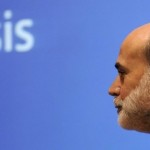Throwing Money at the Problem
 We’ve spent $350 billion to stimulate the financial system, thus far with no obvious effect. Naturally, this calls for dumping in that much again — and perhaps again after that. I discuss this odd situation over at New Atlanticist in a piece called, “Stimulus Has its Limits (But We Don’t Know What They Are).” My conclusion:
We’ve spent $350 billion to stimulate the financial system, thus far with no obvious effect. Naturally, this calls for dumping in that much again — and perhaps again after that. I discuss this odd situation over at New Atlanticist in a piece called, “Stimulus Has its Limits (But We Don’t Know What They Are).” My conclusion:
The beauty part is that we’ll never know what, if anything, worked. One presumes this crisis, like all its predecessors, will pass. When it does, analysts will cherry pick from among the myriad solutions we threw at the problem as evidence that their preferred solution is what did the trick. But it’s not inconceivable that doing nothing — were that a politically viable option — would have been just as effective.
Read the rest.






The really frightening part is, if we assume any of this nonsense actually worked, the situation was far worse than we were led to understand.
One can imagine many reasons for such withholding of information… not least of which not wanting to cause a panic, and the more sinister and more likely in my view, being that they didn’t want us to know who and what was responsible for the melt-down.
Or as others have said before, “Don’t just do something, stand there!”
But I’d disagree that there is no obvious effect. It just isn’t the one intended. Watch what happens now as federal spending becomes utterly decoupled from reality.
Just to be fair the bailout could have already had the obvious effect of preventing a financial collapse. Can’t prove it one way or another but it should be considered in the discussion.
The TARP Reform Bill that Barney Frank is trying to push through not only gives the banks the remaining $350 billion, it gives the banks access to more money through direct borrowing by the FDIC and Treasury without Congressional oversight.
http://ewebsmith.com/Gov/tarpreform.html
No question, Steve. But as I say in my other comment in this thread, if that’s the case, the situation is far worse than we originally led to believe. At least, that would be the indication of our current situation, despite having all kinds of money already having been thrown at it.
James: “But it’s not inconceivable that doing nothing — were that a politically viable option — would have been just as effective.”
It’s not inconceivable that giving *me* and my friends and extended family each $1 billion woul have fixed the economy better than anything else. “It’s not inconceivable” is a poor argument.
The point is that nobody has any idea whether the first $350bn has done any good whatsoever. It may have even hurt, since everybody’s stopped in their tracks waiting for government to act.